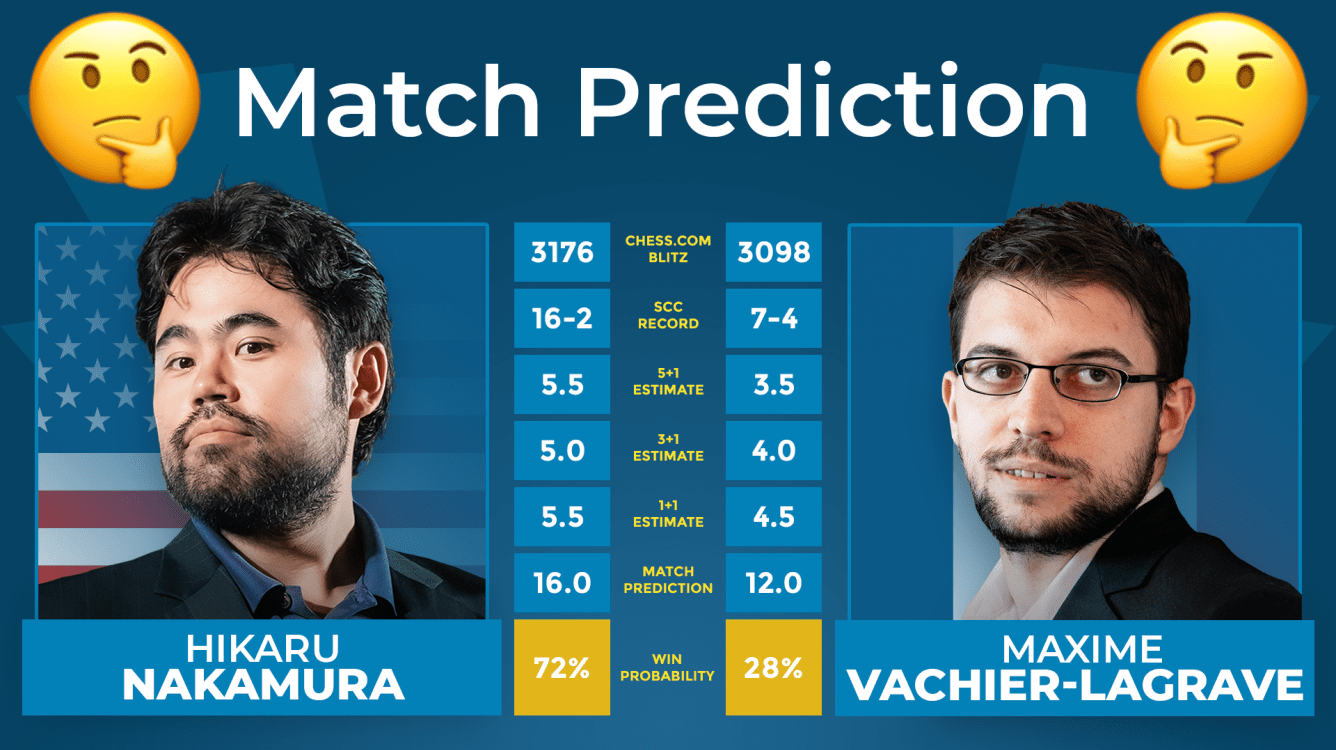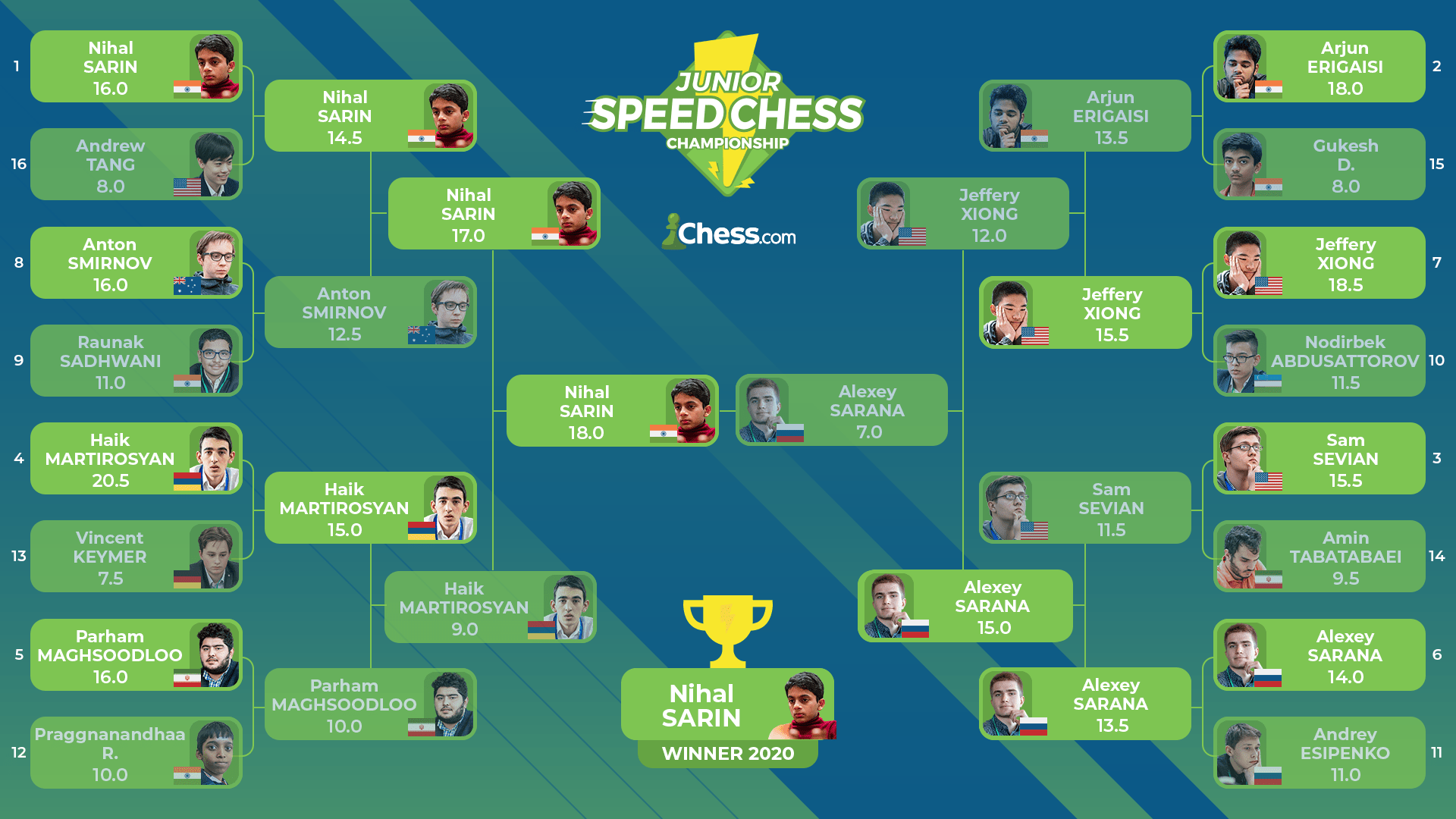
How Smart Are The SmarterChess Predictions?
In April 2016, the GM Blitz Battle Championship kicked off on Chess.com with seven of the world's top blitz players plus one qualifier open to grandmasters and international masters with FIDE ratings of 2500+. I started closely tracking the results of the GM Blitz Battle and continued tracking into the 2017 Speed Chess Championship and presented Danny Rensch with a proposal. What if I created predictions and live odds for these matches? I presented Danny with some prototypes, he loved the idea, and the SmarterChess predictions were born. The SmarterChess predictions started mid-way through the 2017 SCC and have continued through the present.
How The Predictions Are Made
Since the beginning, I have employed a system based on creating segment ratings for each of the time controls (5-minute, 3-minute, 1-minute). Each segment rating is formulated based on past Speed Chess Championship results, Chess.com ratings, FIDE ratings, trends, and some minor adjustments based on intuition. The segment ratings between any two players feed formulas that give an expected score between the players in each segment. Next, I add a standard deviation that is dependent on how many games the players have played in previous Speed Chess Championship events. The combination of the expected scores and standard deviation feeds the pre-match odds.
As the matches progress, I adjust the formulas to add up the current score plus adjusted prediction and standard deviation for the rest of the match. For this article, we will be focusing on how well the pre-match predictions and odds have done in past SCC matches.
2017 Speed Chess Championship
The first official prediction in the 2017 Speed Chess Championship came in the 11th game of the bracket, Hikaru Nakamura vs. Fabiano Caruana. I predicted that Nakamura would win 16.5-10.5 and the score ended at 17-10 in favor of Nakamura. This led us to believe these predictions could actually work! The SmarterChess prediction called a 50-50 tie in Sergey Karjakin vs. Nakamura, which Nakamura won by three points. The predictions correctly called the remaining four matches. Giving half-credit for the tie prediction, we'll call this 4.5/5 (90%) for the season.

2018 Speed Chess Championship
The 2018 Speed Chess Championship was the first full bracket to put the predictions to the test. Seven of the 16 players were new, meaning there was less previous information to build their segment ratings. Six of the first-round predictions were correct, incorrectly predicting that Karjakin and Shakhriyar Mamedyarov would win their match-ups. Jan-Krzystof Duda was a big surprise win over 2017 Semi-finalist Karjakin. Mamedyarov was number three in the world at the time and rated 2820 FIDE, but he ended up losing by two points to Anish Giri. In the remaining seven matches, the predictions correctly called five of them, only getting the Duda matches wrong. Three strikes on Duda predictions for the year. ![]()
The 2018 SCC SmarterChess predictions correctly called 11/15 (73%) of the matches.

2019 JSCC And WSCC
In 2019, Chess.com introduced the Junior Speed Chess Championship and Women's Speed Chess Championship. Both events ran at the same time and featured players that were mostly new to the SCC format. This made for some very difficult predictions as many of these players also did not have FIDE Blitz, FIDE Rapid, or Chess.com ratings. In the JSCC, the predictions correctly called 10/15 (67%). For the WSCC, the predictions were correct for 2/7 (29%) of the matches. The favorites outperformed the predictions by winning 13/15 in JSCC and 3/7 in WSCC.
2019 Speed Chess Championship
The 2019 Speed Chess Championship improved slightly on the 2018 SCC results by correctly predicting 12.5/15 (83%) of the matches. We are giving a half-point credit for the Duda vs. Giri match. It was predicted as a 50-50 split, and Duda won the match 14.5-13.5. Similar to how Duda was a surprise in 2018, in 2019 we saw Vladislav Artemiev shock fans by beating both Alexander Grischuk and Levon Aronian. The models learned to now predict the new star to win the third match after failing to predict the first two wins and correctly called Wesley So defeating Artemiev in the semi-finals.

2020 WSCC And JSCC
The 2020 Women's Speed Chess Championship went with a different format than head-to-head matches, and I didn't run any predictions for the championship. For the juniors, we saw the traditional bracket of 16 players, many of them we have seen in previous JSCC or SCC brackets. The SmarterChess predictions correctly called the first eleven matches in a row but started to falter in the quarterfinals. The models predicted that both Sam Sevian and Jeffery Xiong would take down Alexey Sarana on the right-hand side of the bracket. The model also thought that blazing-hot Haik Martirosyan would defeat Nihal Sarin and ended up with 12/15 (80%) correct predictions.

2020 Speed Chess Championship
The 2020 Speed Chess Championship just concluded this month and saw some very exciting matches right down to the finals. In the first round, I incorrectly predicted Alireza Firouzja and Ian Nepomniachtchi advancing. On paper, Firouzja was a 4-point favorite and appeared to be slightly stronger in all formats over Vladimir Fedoseev. Nepomniachtchi was only predicted to win by one point and ended up losing by three. The other match that was incorrectly predicted was that the world champion Magnus Carlsen would be upset by Maxime Vachier-Lagrave.
For the season, the SmarterChess predictions called 12/15 (80%) of the matches.

Overall Summary
The SmarterChess predictions have correctly called 64/87 (74%) of total matches. If we focus solely on SCC matches, where there is more reliable data, the predictions hit on 40/50 (80%). The higher seed won in 72% of those SCC matches.
| Event | Correctly Predicted | Matches | % Correct |
| SCC 2017 | 4.5 | 5 | 90% |
| SCC 2018 | 11 | 15 | 73% |
| WSCC 2019 | 2 | 7 | 29% |
| JSCC 2019 | 10 | 15 | 67% |
| SCC 2019 | 12.5 | 15 | 83% |
| JSCC 2020 | 12 | 15 | 80% |
| SCC 2020 | 12 | 15 | 80% |
| TOTAL | 64 | 87 | 74% |
Here's a chart looking at point spread (higher seed's points minus lower seed's points) differed between SmarterChess predictions and actual results. Each blue dot represents one match, and dots in the upper right and lower left quadrants (green boxes) are correct predictions. The blue trendline shows that the predictions do a fairly good job, and the points outside of the green boxes are not too egregious.

An example of a common type of question I receive is: "why does player B only have a 22% chance of winning?" Sometimes in sports betting, bettors tend to expect or predict extreme outcomes to happen more often than they do in reality. If we know our potential biases in advance, we can try to correct them.
This next table compares the pre-match odds with the percentage of time the predicted winner actually wins the match. This table shows that the percentages line up pretty closely with how often the predicted favorite wins.
| Odds | Favorite Wins | Number Of Games | Correctly Predicted |
| 51-69% | 29 | 45 | 64% |
| 70-89% | 24 | 30 | 80% |
| 90%+ | 10 | 10 | 100% |




